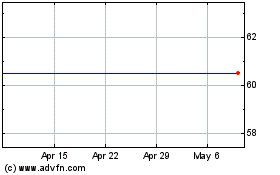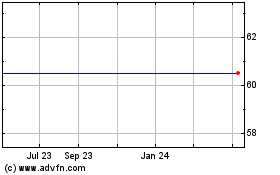Unilever, Nestlé Test Investor Patience With Slower Sales -- Update
October 19 2017 - 9:49AM
Dow Jones News
By Saabira Chaudhuri and Brian Blackstone
Two of the world's biggest consumer goods companies--both caught
in investors' crosshairs--reported another round of weak sales,
ratcheting up pressure to accelerate promised turnarounds.
Unilever PLC missed analysts' sales forecasts by a wide margin,
Thursday, reporting growth in the third quarter of 2.6% compared
with a year earlier. Analysts had expected the maker of Dove soap
and Hellmann's mayonnaise to post sales gains of 3.9%, stripping
out things like acquisitions and divestitures. Shares were down
more than 4% in London afternoon trading.
Nestlé SA, meanwhile, said sales weakened in the first nine
months of the year, and it doesn't expect an improvement in the
final quarter. The Swiss consumer giant reported sales growth of
2.6% for the first nine months of the year. It said it was on track
to post 2.6% growth for the full year, too, compared with 3.2% last
year.
The owner of Kit Kat chocolate and Nescafé coffee also said it
would take new restructuring charges of 400 million to 500 million
Swiss francs ($410 million to $512 million) this year, as it
accelerates efforts to cut out longer-term costs. The charge will
eat into full-year profit margins. Nestlé shares were down 0.6% in
London.
For both companies, the clock is ticking. Investors across the
sector have called for significant changes at many of the
industry's largest players. The revolt is playing out amid a
sector-wide downturn blamed on fast-changing buying habits by
consumers world-wide.
Earlier this year, Unilever rejected a $143 billion bid by Kraft
Heinz Co. It acknowledged in the aftermath that it needs to do more
to keep shareholders happy--and to keep itself off the target list
of other potential acquirers.
It promised to boost returns through share buybacks, higher
profit margins and a fresh willingness to leverage the balance
sheet. It also put its margarine business up for sale. Under Chief
Executive Paul Polman, Unilever has already been cutting costs
sharply.
Thursday's disappointing sales set up a fourth-quarter sprint
for Unilever to make its full-year forecast of 3% to 5% growth. RBC
analyst James Edwardes Jones said that target would be "a stretch,"
given its performance so far this year. He also said Unilever's
ability to achieve a margin target of 20% by 2020--one of the
things it promised investors after the Kraft Heinz bid--will be
"jeopardized" if the company can't step up sales growth.
Unilever relied heavily on price hikes for third-quarter growth,
instead of volume growth, a red flag for analysts. Some investors
showed signs of impatience. Simon Gergel, chief investment officer
for U.K. equities at Allianz Global Investors, a big Unilever
shareholder, said that with the weak sales volume growth "there
could be questions raised about the sustainability" of Mr. Polman's
strategy prioritizing cost-cutting and profit margin increases.
Unilever's two biggest competitors, Procter & Gamble Co. and
Nestlé , are already under pressure from activist investors. Nelson
Peltz narrowly lost a proxy vote at P&G, and has called for
deep structural changes at the U.S. giant. So far, Mr. Polman has
avoided that sort of public pressure, but it is far from clear that
he can do so indefinitely. He has also so far resisted some of the
bigger structural changes that some critics have said are
necessary--like splitting Unilever's food holdings and its
consumer-goods brands.
Crosstown rival Reckitt Benckiser Group PLC, earlier this week,
said it would split its own businesses--creating a consumer health
group and a home-and-hygiene group--to focus management on boosting
growth at both units.
Nestlé, meanwhile, is busy trying to keep its own activist
investor at bay. Dan Loeb's Third Point is now one of its biggest
shareholders. Nestlé CEO Mark Schneider, who took over earlier this
year, has already done a number of things Mr. Loeb has asked for:
He set a profit margin target, launched share buybacks and has used
deal making to diversify Nestlé's portfolio--away from
slower-growing packaged snacks and toward smaller, faster-growing
brands. Mr. Schneider also put Nestlé's U.S. chocolate business up
for sale.
If Nestlé can't show signs of a turnaround, Mr. Loeb--or
others--may increase pressure for bigger moves. A spokesperson for
Mr. Loeb declined to comment Thursday.
Both companies have turned to the deal table, though they have
so far eschewed the big, transformative moves that were a hallmark
of the industry in the past. Through big acquisitions, P&G,
Kraft, Unilever and Nestlé all built themselves into packaged-goods
powerhouses. In previous downturns, innovation and marketing were
typically enough to stoke flagging sales. Today, with consumers
looking for healthier or more local brands, those big deals don't
seem as obvious a fix.
Since August, Unilever has agreed to buy niche brand Weis ice
cream in Australia; Pukka Herbs, an organic tea brand, in the U.K.;
Carver, a premium skin care brand in South Korea; and Mae Terra, an
organic packaged food brand in Brazil. Nestlé has snapped up
plant-based food maker Sweet Earth and acquired stakes in artisanal
coffee chain Blue Bottle and delivery service Freshly.
Write to Saabira Chaudhuri at saabira.chaudhuri@wsj.com and
Brian Blackstone at brian.blackstone@wsj.com
(END) Dow Jones Newswires
October 19, 2017 09:34 ET (13:34 GMT)
Copyright (c) 2017 Dow Jones & Company, Inc.
Unilever NV (NYSE:UN)
Historical Stock Chart
From Mar 2024 to Apr 2024

Unilever NV (NYSE:UN)
Historical Stock Chart
From Apr 2023 to Apr 2024
